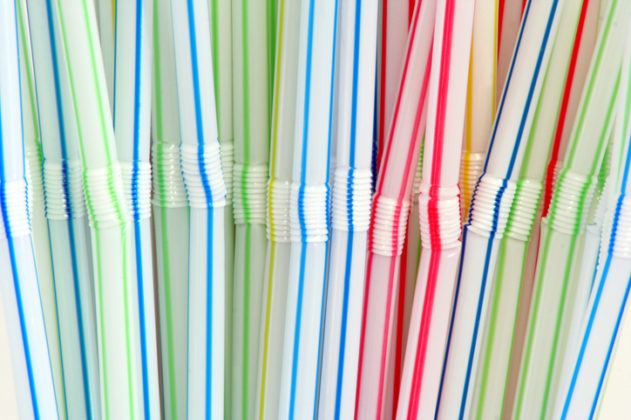Disabled people with neurological, muscular, and movement disorders often rely on plastic straws to safely drink liquids. Far from “non-essential,” these straws provide a critical conduit for hydration.
Seattle made news when it became the first major city to ban plastic straws July 1. Monday, Seattle-based company Starbucks announced that it too will eliminate plastic straws from all of its stores by 2020.
While liberals hail this as a victory for the planet, disabled people like me are left asking a familiar question: What about us?
As a Seattleite, I’ve long since been grateful to live in such a progressive city. But the straw ban is the latest example of liberals ignoring the needs of marginalized people in favor of ill-conceived policies.
Don’t get me wrong: Plastics are problematic. Vox estimates that Americans throw away 175 million plastic single-use straws every day. Plastic isn’t biodegradable, but plastics break down over time into carcinogenic microplastics. These microplastics wash into our oceans, and it’s estimated that by 2050 there will be more plastic than fish in the ocean.
Sounds bad, right? No wonder everyone wants to ban straws. Except, as it turns out, straws are the gateway plastic, so to speak. Straw ban campaigns arose not because straws themselves are so critical on the environmentalist front but because they were perceived as a non-essential item that could raise consumer awareness and drive the elimination of other plastics.
“Our straw campaign is not really about straws,” Dune Ives, the executive director of Lonely Whale, the organization that led the straw ban movement in Seattle, told Vox. “It’s about pointing out how prevalent single-use plastics are in our lives. Putting up a mirror to hold us accountable. We’ve all been asleep at the wheel.”
So now that we’ve got the environmental hysteria out of the way, let’s talk about straws.
Even though the straw ban went into effect in Seattle last week, few people seem aware of the negative impact it has on disabled people and people with severe allergies. Disabled people with neurological, muscular, and movement disorders often rely on plastic straws to safely drink liquids. Far from “non-essential,” these straws provide a critical conduit for hydration.
I’m familiar with this first hand. I have mitochondrial disease, a genetic disorder of cellular energy production. In simple terms, my cells can’t produce enough energy to power my body. One of my hardest hit areas is my muscles. Before my diagnosis, when my health was at its worst, I struggled to breathe, chew, and swallow. The only way I could drink from a glass was with a straw.
Environmentalists have a lot of alternatives to offer: paper straws, biodegradable straws, and reusable straws. Starbucks is developing a sippy-cup lid as a straw alternative (which is already in use in some of its beverages). But none of these fulfill the same need for disabled people as plastic straws.
If you’ve ever attempted to use a paper straw for longer than about 5 minutes, you probably know how ineffective they are in the best-case scenario. But even when they hold up to liquids, they don’t provide the rigidity necessary for people who lack the muscle control to avoid clamping down on straws. Plastic gives as you bite down, but remains largely usable. Paper becomes unusable, and worse yet it can becoming a choking hazard.
Biodegradable straws offer the closest textural match to plastic straws. However, none of them offer the ability to bend, which can be critical for some disabled people. And biodegradable straws are plant-based, generally corn or wheat, which are common allergens. Since it’s nearly impossible to find out which straws contain allergens and which don’t, this makes biodegradable straws off limits for anyone with severe allergies.
As for reusable straws, they’re generally made from metal or other inflexible materials that can become dangerous for people with disabilities. Even when they’re made from reusable plastic, it requires the ability to wash them and carry them, which is out of reach for many disabled people.
Proponents of the straw ban point out that Seattle’s ban contains an exemption for plastic straws for disabled people who aren’t able to use compostable straws. However, it’s absurd to believe that businesses will routinely stock plastic straws solely for the needs of disabled customers when they’re required to provide reusable or compostable straws for everyone else.
Furthermore, these type of exemptions force disabled people to prove their disability to access basic accommodations. As someone who has been screamed at twice in the same week for parking in a disabled parking spot with my disabled placard fully visible, I can guarantee that these exemptions will lead to more harassment of disabled patrons.
Multiple cities in California have switched to a “by request only” policy for plastic straws (following in the footsteps of a 2015 California requirement to serve water in restaurants by request only). Rather than enacting blanket straw bans that harm disabled people, cities could make significant progress toward reducing single-use plastics by passing “by request only” regulations instead.
Yet, despite Seattle’s progressive rhetoric, my fellow liberals seem to have no problem sacrificing disabled people at the altar of environmentalism. The message is loud and clear: feel-good environmental activism is more important than the accessibility needs of disabled people.
Jody Allard is a former techie-turned-freelance-writer living in Seattle. She can be reached through her website, on Twitter or via her Facebook page.
Other Links:

